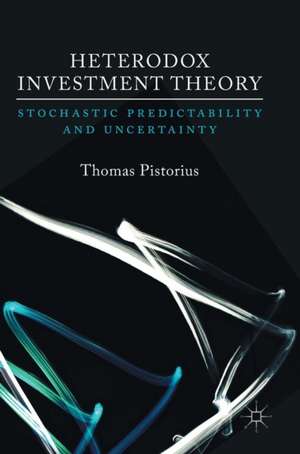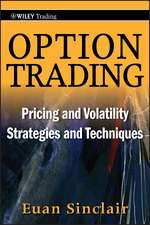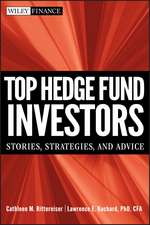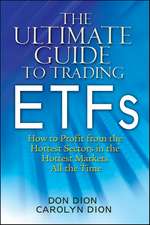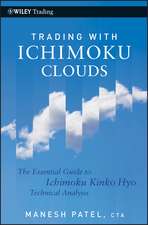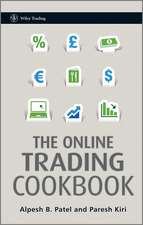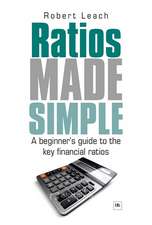Heterodox Investment Theory: Stochastic Predictability and Uncertainty
Autor Thomas Pistoriusen Limba Engleză Hardback – 5 sep 2017
This book combines the study of rhetoric, history, philosophy, philosophy of statistics and the culture of investing to discuss the foundations of stochastical predictability in investment theory. Besides discussing the problem of stochastical prediction, the book also covers alternative investment theories. Ideas from uncertainty economics, expressed by the likes of Keynes, Knight, von Mises, Taleb and McCloskey are also discussed. This book will be of interest to researchers and academics in the field of investment theory, as well as investment practitioners.
| Toate formatele și edițiile | Preț | Express |
|---|---|---|
| Paperback (1) | 682.53 lei 38-45 zile | |
| Springer International Publishing – 3 aug 2018 | 682.53 lei 38-45 zile | |
| Hardback (1) | 728.74 lei 6-8 săpt. | |
| Springer International Publishing – 5 sep 2017 | 728.74 lei 6-8 săpt. |
Preț: 728.74 lei
Preț vechi: 888.71 lei
-18% Nou
Puncte Express: 1093
Preț estimativ în valută:
139.45€ • 149.11$ • 116.27£
139.45€ • 149.11$ • 116.27£
Carte tipărită la comandă
Livrare economică 18 aprilie-02 mai
Preluare comenzi: 021 569.72.76
Specificații
ISBN-13: 9783319550046
ISBN-10: 3319550047
Pagini: 257
Ilustrații: XIII, 257 p. 7 illus.
Dimensiuni: 148 x 210 x 23 mm
Greutate: 0.48 kg
Ediția:1st ed. 2017
Editura: Springer International Publishing
Colecția Palgrave Macmillan
Locul publicării:Cham, Switzerland
ISBN-10: 3319550047
Pagini: 257
Ilustrații: XIII, 257 p. 7 illus.
Dimensiuni: 148 x 210 x 23 mm
Greutate: 0.48 kg
Ediția:1st ed. 2017
Editura: Springer International Publishing
Colecția Palgrave Macmillan
Locul publicării:Cham, Switzerland
Cuprins
Chapter 1: Introduction.- Chapter 2: The History of Investment Theory.-Chapter 3: Investment Theory, Probability Theory, and Uncertainty.- Chapter 4: Beyond Statistics: A New Rhetoric for Investment Theory.- Chapter 5: The Culture of Investing.- Chapter 6: Conclusions.
Recenzii
“Heterodox Investment Theory is a thought-provoking book … . The book’s greatest contribution is to encourage investment professionals to look beyond the standard investment models that are taught in business schools and the statistics underlying the theories and to consider alternative models that may enhance their understanding of financial markets. Those who are comfortable with the jargon of philosophy and rhetoric will likely find this an interesting book that opens up their minds to new modes of thinking.” (Ronald L. Moy,Enterprising Investor, blogs.cfainstitute.org, June 21, 2019)
Notă biografică
Thomas Pistorius, PhD, holds a Masters degree in finance from Tilburg University and a Bachelor in philosophy from Utrecht University, Netherlands. He has spent his professional life working in investment management as an investment advisor, analyst, risk manager, and researcher. His research is driven by an interest in finance and the arts, encompassing the rhetoric, history, philosophy, and culture of investment theory to discuss stochastic predictability.
Textul de pe ultima copertă
The best and the brightest investment gurus often rely on rational, statistical calculations of risk and return of investments. Pistorius traces their rhetoric and comes to a modest conclusion that stochastic predictability does not exist in investing. Thus, if we follow investment advice, we are gambling because of their rank in professional hierarchies of status and authority, not because of their access to the holy grail of a successful prediction.
— Slawomir Magala, Professor of cross-cultural management (emeritus), Rotterdam School of Management, Netherlands, and, Professor of management and social communication, Jagiellonian University Cracow, Poland
This book combines the study of rhetoric, history, philosophy, philosophy of statistics and the culture of investing to discuss the foundations of stochastic predictability in investment theory. Besides discussing the problem of stochastic prediction, the book also covers alternative investment theories. Ideas from uncertainty economics, expressed by the likes of Keynes, Knight, Von Mises, Taleb and McCloskey are also discussed. This book will be of interest to researchers and academics in the field of investment theory, as well as investment practitioners.
Caracteristici
Combines the study of finance and the arts Explores the issue of stochastical prediction Presents alternative investment theories Engages with ideas from uncertainty economics
